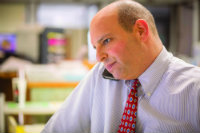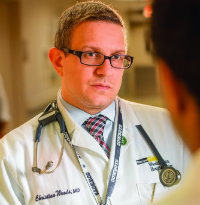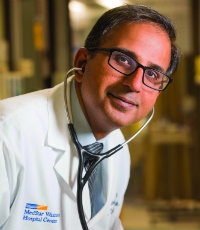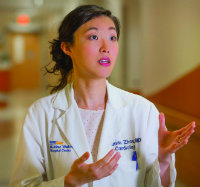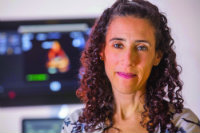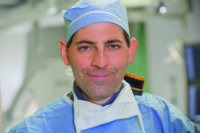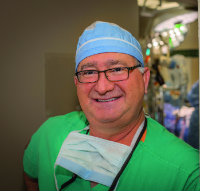Find care now
If you are experiencing a medical emergency, please call 911 or seek care at an emergency room.
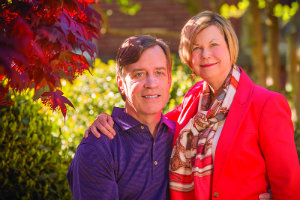
An inaccurate diagnosis at another hospital almost cost Steven Jones his life. Fortunately, his wife, medical director of Washington Cancer Institute at MedStar Washington Hospital Center, knew who to call. Within 12 hours, Jones was transferred, re-diagnosed, stabilized and had undergone surgery to repair his mitral valve. Both Jones and his wife, Sandra Swain, MD, FACP, credit the quick, round-the- clock expertise of Medical and Coronary ICUs and MedStar Heart & Vascular Institute (MHVI) team with his complete recovery.
In the early hours of Wednesday morning, Feb. 25, Jones, 61, retired Treasury Department law enforcement executive, was using strong chemicals to clean up after a kitchen remodeling. His heart suddenly started pounding. “I went upstairs and took some aspirin,” he recalls. “I work out three times a week, have no health issues and—in typical fashion—was in complete denial anything could be wrong.” He went to bed not terribly concerned, but woke his wife to tell her what had happened. Soon he had difficulty breathing, and she said, “I can hear your lungs gurgling. We’re going to the hospital.”
They arrived at a nearby hospital around 3 a.m. and told the staff he’d probably inhaled some noxious fumes. Jones was given a nebulizer and an EKG. His condition deteriorated rapidly. He lost consciousness and was placed on a ventilator. Increasingly worried, Dr. Swain called colleagues at the Hospital Center for advice and soon started working with Andrew Shorr, MD, medical director, Medical Intensive Care Unit, on a transfer that occurred Thursday afternoon.
Dr. Shorr and Chris Woods, MD, were working when Jones arrived. “He was in shock,” says Dr. Woods. “His diagnosis was chemical inhalation, but that diagnosis didn’t fit his symptoms.” Dr. Shorr agrees, “His physiology was inconsistent with the diagnosis, so we backed up and started over.”
About 6 p.m., critical care fellow Adnan Hussain, MD, who was also monitoring Jones, says, “His oxygen levels and blood pressure were really low, even though he was on several medications.” By careful auscultation, Drs. Hussain and Woods heard a heart murmur. Dr. Hussain contacted on-call cardiology fellow Wunan Zhou, MD, who confirmed the murmur, and did a bedside trans- thoracic echocardiogram. She identified a valve problem, but wanted a more definitive test.
Dr. Zhou contacted on-call echocardiologist Rachel Marcus, MD, who did a transesophageal echocardiogram (TEE) at 10 p.m., which showed clearly severe, acute mitral valve regurgitation. She says, “It was consistent with the chest X-ray findings showing focal/unilateral pulmonary edema likely related to the mitral regurgitation jet.”
Jones would need surgery fast. Cardiac surgeon Ammar Bafi, MD, an expert in mitral valve repair, sched- uled emergency surgery for 6:30 a.m., but Jones was in cardiogenic shock—his blood pressure was critically low and he couldn’t breathe on his own. He needed an intra-aortic balloon pump to stabilize his circulation to withstand the surgery. Interventional cardiologist Robert Lager, MD, came in at 2 a.m. to insert the pump. He says, “It’s not at all unusual to come to do a procedure when I’m on call. What is unusual about this case is that the chemical inhalation diagnosis was an utter red herring, and the real cause was discovered by the CCU team here, leading to the subsequent emergent procedures.”
Dr. Bafi says, “Mitral valve repair is something I have a lot of experience in. The beauty of repair is that patients keep their own valve. We removed the part of the valve with the broken mitral cords, and reconstructed it using his own tissues. The only foreign material is a ring to narrow the opening so the valve leaflets close perfectly. Jones probably progressed from minimal leaking of the valve to rupturing four cords with sudden torrential mitral regurgitation. I’ve encountered this situation before, but it’s quite rare.
“Jones was very lucky,” he continues. “Because we’re an advanced cardiac and vascular center, we can mobilize quickly, 24 hours a day. Jones could not have survived another 24 hours. And finally, he’s fortunate we were able to repair, rather than replace, his valve.”
Dr. Swain has a newfound understanding of the hospital where she works. “I have great insights as a patient’s family member,” she says. “The Heart & Vascular Institute is a fabulous place from A to Z, with a highly coordinated team of very professional, extremely engaged passionate people. From the MedSTAR Transport team to the highly trained nursing staff, I was just amazed. But it was a very lonely night for me, extremely lonely. I was told the mortality rate was 20 percent from this surgery, and I thought I would lose him. But Dr. Bafi gave me confidence, and I knew from every- one else that the whole surgical team was exceptional.”
Dr. Bafi gave Dr. Swain the good news after the three- hour surgery. She recalls, “He said, ‘Yes, we were able to repair the valve, and his heart was so happy with the repair, he flew right off the table!’”
Jones doesn’t remember many of the people who helped save his life, only those after he woke up. “Every one of them showed their compassion and care,” he says. “I am forever grateful that Dr. Bafi was able to repair my valve. I’m able to return to my normal life without a litany of medicine or restricted diet. I was on the edge of death and without batting an eye they figured it out, fixed it, and within days, I was up walking around.”
18 Hours from Potentially Fatal, Inaccurate Diagnosis to Recovery
Thursday, 12 p.m.Dr. Shorr helps arrange transport to MWHC
Thursday, 4 p.m.Jones is admitted to the MICU at MWHC.Drs. Shorr and Woods begin questioningdiagnosis of chemical inhalation.
Thursday, 6 p.m.Drs. Hussain and Woods hear heart murmor.
Thursday, 8 p.m.Dr. Zhou confirms heart murmor anddoes a bedside TTE. Suspects heartvalve problem.
Thursday, 10 p.m.Dr. Marcus does TEE and confirms severe mitral valve regurgitation.
Friday, 2 a.m.Dr. Lager inserts baloon pump to stabilize Jones.
Friday, 6:30 a.m.Dr. Bafi repairs mitral valve.














